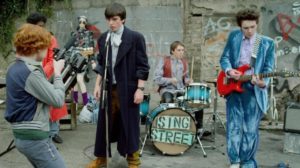A group of teenagers in Ireland form a rock band and learn about life, love, and themselves. But while this concept sounds familiar, this is no “That Thing You Do” or even “Almost Famous.” “Sing Street” is a celebration of music and it’s healing power. And it’s a tale of family and love lost and found. A character refers to music as “happy/sad” – and the description couldn’t be more perfect. “Sing Street,” written and directed by John Carey, is a powerful and moving film about coming of age and the unbreakable bonds of dreams, hope, and family.
Like many coming of age forays, adults are missing from this film. That is, except for an absentee mother and father (Aiden Gillen, Maria Doyle Kennedy), and a verbally and physically abusive Christian Brother (played by Don Wycherley). The film’s youths are left woefully alone. At the forefront is young Connor (Ferdia Walsh-Peelo in a first role), and his brother Brendan (played magnificently by Jack Reynor). A gaggle of others students, played by a variety of young actors, round out the cast of Connor’s schoolmates.
The basic premise here is that young Connor is forced out of his private school and inserted into a public, all boys school on Synge Street, a name which the movie plays on casually with its title.
Connor is confronted by all sorts of adversaries, such as bullies, old students that shun this newcomer, and the aforementioned Brother, who runs a tight ship, early on publicly ridiculing him for not wearing black shoes, and later dragging him forcefully to a sink to wash his face when he disapproves of his appearance. But amidst this, young Connor makes some friends, who soon become bandmates, and a love interest, Raphina, played with sublime skill by Lucy Boynton.

“Sing Street” oscillates between poignant observations on life and musical numbers, but, mind you, the film is not a musical. It features Connor and his band members, aptly named, ‘Sing Street,’ recording musical videos for various songs they write. Connor is inspired by a Duran Duran song (“Rio,” which we see on television in its ‘80s glory, critiqued with skill and depth by his brother Brendan), but learns from his brother to write his own songs, not to simply be a ‘covers band.’ He takes the advice well; and though Connor is a good student and Brendan is a college dropout, we see a love and respect beneath the surface that is all but impenetrable.
Musically, “Sing Street” is wonderful, and we learn that the film’s seven musical numbers are written by Carney and singer-songwriter Gary Clark, which blend perfectly with the film’s emotions. A secret glance, a stolen kiss, an argument, a disagreement… “Sing Street” expertly weaves these together to form not a soundtrack list, but an complex painting of emotion. Connor becomes inspired by various artists, and we see him imitating, in appearance, the likes of Goth sensations like Robert Smith from The Cure. This is wisely paired with the track “In Between Days” by The Cure, which sells the picture even further.
Of course, all is not roses and musical exploration here. There’s hardship. We see Irish people leaving Dublin in droves for London, for a better life, as Connor and his bandmates muse over song lyrics and heartache. This is also contrasted with the stagnation Connor, and especially his brother, feel at their parents’ decaying marriage. In one painful exchange, Brendan recounts the torturous years of his life before his younger brother Connor arrived, and how his parents’ loveless marriage effected him so. Reynor sells this scene to us with his pain, his authenticity, his anger. It’s easily the film’s best scene.
“Sing Street” is a wonderful movie, filled with all the things that make independent films so successful. It has a focus on relationships over drama, weaving its intricate soundtrack to accentuate the film’s happenings, not to overtake them. Its strengths lie in the chemistry its key actors have with one another, none so strong as between Brendan and Connor throughout.
The bottom line: You’d be hard pressed to do better than “Sing Street” if you are a fan of indies or well-crafted dramas. It’s slow to start, but powerful to finish, and is a testament to the human spirit. Do yourself a favor and give this movie a try.
– by Mark Ziobro